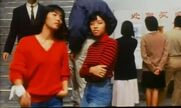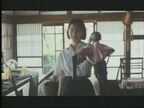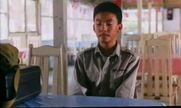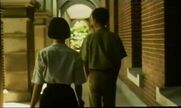After the delicate and restrained narration of an old man in "Yi Yi", I seem to have formed a strange inherent impression of Yang Dechang. Until last night, after watching the terrifying 1991 "Kuling Street Murder Case", I had a new understanding of this seemingly gentle Taiwanese new film director and the entire Taiwanese film, and I also understood why so many In the eyes of people, "Guling Street" has the best position in film history.
"Guling Street" is like a sharp and pointed samurai sword. Through the self-sacrifice of this group of restless teenagers in Taiwan's special period, it has opened a hole in the entire Taiwanese society. In my opinion, "Guling Street" is by no means Yang Dechang's good memories of his youth, (this is also where I think it is better than Jiang Wen's "Sunny Days")
All the romanticism in the film, all the sincere affection, disappeared under the oppression from small to large, from family to country and finally to the whole society. This is Yang Dechang's indictment and reflection on the ultimate in society, and it is also his hymn to romanticism and heroism with absolute pessimism. This is a movie that is not afraid of spoilers, and the director is obviously aware of this. He spoiled the most important part of the film in the title. Fallen powerlessness.
part1. Audiovisual language
The audio-visual language of the film carried various characteristics of new Taiwanese films at that time: unreasonable shot scheduling, deliberately slowed editing rhythm, preference for medium and long-range fixed and long shots, and even constituted an important motif of the film, highlighting the The insignificance and powerlessness of the individual in the society as a whole. One of the most memorable and typical scenes that used the camera to reverse the climax is Honey's single-handedly confrontation with Shandong and his younger brothers in front of the theater. That scene is undoubtedly the highlight of Honey's role in this play. It's a tragic swan song, but Yang Dechang uses a panoramic fixed lens that is almost a peeping perspective to show the whole process. Honey, who is dressed in a navy uniform, looks a bit funny under the encirclement and suppression of his younger brother and everyone's onlookers, but the kind of pathetic The feeling does not drop but increases, and the characters seem to be not only in immediate danger, but also in the vortex of the whole society.
The other is the highlight of the film. Xiao Si stabbed Xiao Ming to death on the street of Guling. After Xiao Ming fell, the director suddenly pulled the camera to a panorama of the whole street. Xiao Si stood in the middle of the intersection and called Xiao Ming with trembling. A few students in the street below watched all this in shock. In the background, the patrolmen and adults turned a blind eye to the book stand. This scene lasted for a long time, but the wailing and confusion expected by the audience did not appear at all. With only a few strokes, the style painting of the whole society is drawn. If you say that Chief Jia's "Xiao Wu" didn't draw on this scene at all, I wouldn't believe it.
Yang Dechang's superb and practical use of light is also very eye-catching. Apart from the direct contrast between front and rear bright and dark tones, he uses only the light source in the scene to create a highly infectious atmosphere light without any external light source. , the most typical one is Xiao Si's flashlight, and his actions of turning on and off the lights seem to indicate a kind of flickering and uncertainty about the way forward and the boy's own confusion. It can be said that the four-hour film length does not affect the film quality and authorship of the film at all. This superb control is absolutely unmatched.
part2. Yang Dechang's Secret World - Symbols
Symbols are a very important part of Yang Dechang's film. Just like the camera and the back of the head in "Yiyi", the symbols in "Guling Street" are also the key points that cannot be ignored in expressing the theme of the film. First of all, the symbol with the highest sense of existence in the film is probably the flashlight that Xiao Si stole from the set. Xiao Si inserts this flashlight into his belt almost all the time, and this flashlight has also become the only light source for several dark night scenes. , illuminating the unbearable violence in the dark.
In my opinion, the symbol of the flashlight is an externalized expression of the protagonist's rational perspective. With the help of this flashlight, Xiao Si is always just a bystander and a feeler. In the end, the flashlight was put back on the set by Xiao Si, and then he took a knife to block the pony and also stabbed the heroine to death. Here Xiao Si finally became a witness, which is also the prelude to his complete destruction.
The knife is another very important symbol in the film. The origin of the knife in the film is an important demonstration of the social background: the protagonists who are immigrants from the mainland have to live in Japanese colonial houses, and their houses often leave some relics of the previous owners. : For example, the pony found a samurai sword in his room, Elvis found a dagger and a picture of a woman in his room (PS. The picture became another very interesting little detail in the film, and later it It was pasted on the side of Xiao Si's bed, which seemed to indicate that Xiao Si would use this knife to make a difference.) These knives, as a cultural symbol with a partial Japanese style, metaphorize the inexorable influence of Japanese colonization on the entire Taiwanese society, as an externalization The props are also the source of violence and killing (almost all the dead in the film are given by these knives) I personally think of a more interesting point, the direct motive of Xiao Si stabbing Xiao Ming with the knife at the end is Xiao Ming's sentence : " You can't change me, just like you can't change the world " classic lines, Xiao Si's stab seems to be his last and very external resistance to this kind of value, this knife has also become Xiao Ming's inheritance of Honey The externalized signs of heroism and romanticism also make the character's low moments also become his high-light moments, but what follows is the irreversible collapse of Xiao Si's entire world.
These two symbols are the two most eye-catching symbols in the film, but in fact, there are many symbols in the film, and even the tanks roaring on the street appeared several times just to set off the white horror atmosphere. This is a film of Yang Dechang alone. passwords in the world.
The above analysis of "Guling Street" may only touch about one-tenth of the amount of information in the film. From the perspective of the text that this film review has barely touched on, almost every multi-actor character in this film has its own complete story line, and the characters alone can be analyzed into a book, which also shows Yang Dechang's role in the film's drama. The goodness of the heart is also an important reason why it can be called God as God. Finally, I would recommend this film very seriously. Don't be frightened by its length. Find one afternoon and watch it in one go. You will never regret it.
View more about A Brighter Summer Day reviews











